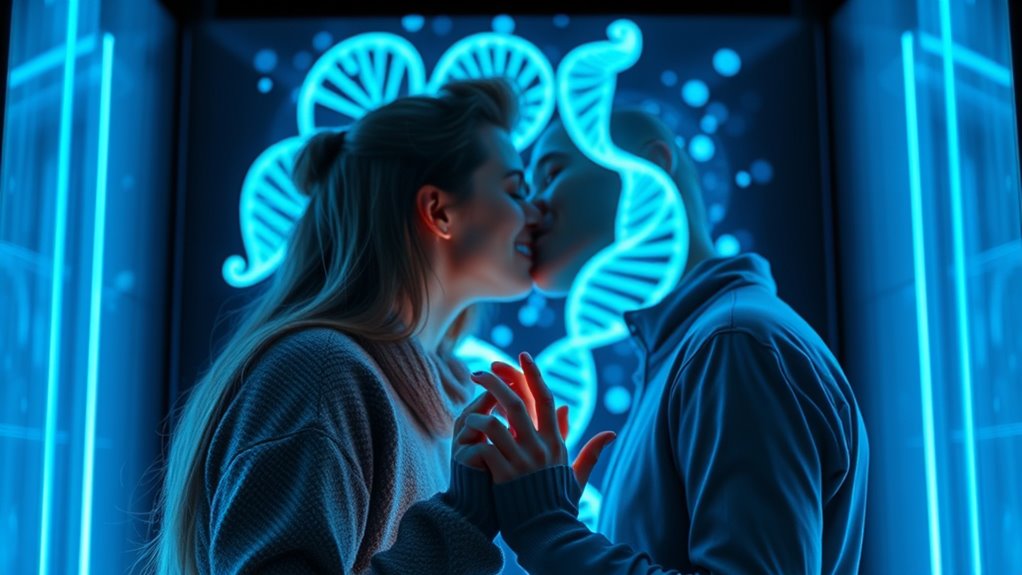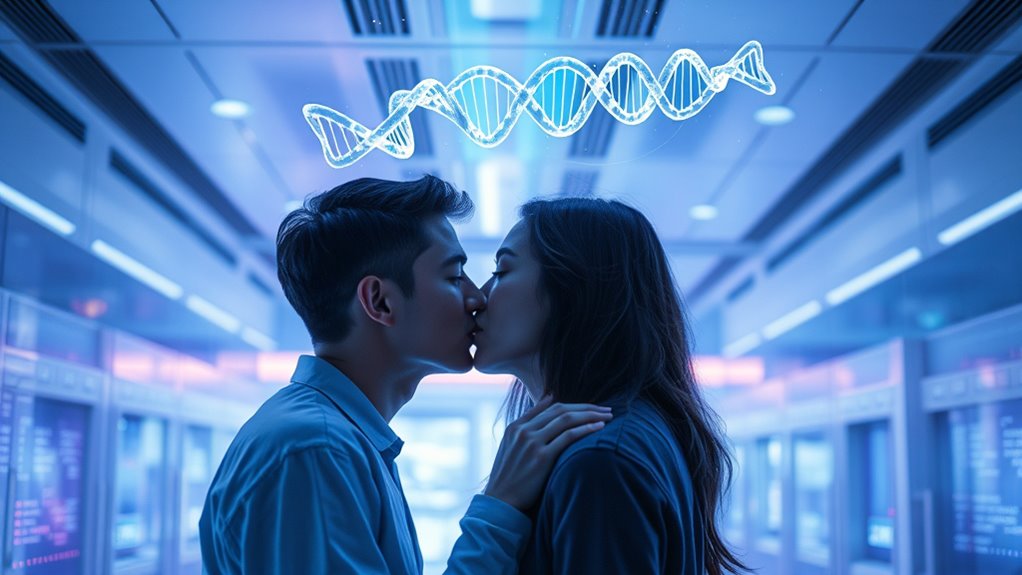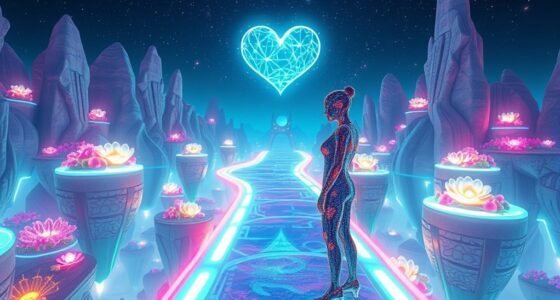The future of DNA-based dating looks promising, offering personalized matchmaking by analyzing genetic compatibility factors like immune system markers and scent preferences. This approach could make your first kiss even more meaningful, as partners are matched on biological signals that foster attraction and trust. As technology advances, expect more sophisticated tests and AI-driven insights that refine long-term compatibility. Stay tuned to discover how this groundbreaking trend might soon change your romantic journey.
Key Takeaways
- DNA-based dating may predict compatibility and chemistry before the first kiss, enhancing initial romantic connections.
- Advances could lead to personalized profiles that suggest optimal timing and circumstances for a memorable first kiss.
- Ethical considerations around privacy and genetic data security will influence the adoption and regulation of DNA-driven romance services.
- Integration of AI and broader genetic markers will improve matchmaking accuracy, potentially transforming traditional dating practices.
- The approach aligns with lifestyle trends like luxurious tiny homes, emphasizing personalized, meaningful relationship experiences.

In recent years, DNA-based dating services have emerged as a novel way to find romantic connections, promising a deeper understanding of compatibility through genetics. Instead of relying solely on profiles, interests, or shared hobbies, these platforms analyze your DNA to assess your genetic compatibility with potential partners. The idea is that our genes can reveal insights into how well two people might connect on a biological level, potentially predicting romantic chemistry before the first date. By examining markers related to immune system compatibility, scent preferences, and even neurotransmitter genes, these services aim to match you with someone whose genetic makeup complements yours.
DNA testing in dating aims to uncover biological compatibility and predict romantic chemistry before the first date.
This approach challenges traditional dating norms by focusing on biological factors that influence attraction and bonding. The science suggests that romantic chemistry isn’t just about shared interests or emotional connection but also about subconscious biological signals. When two people’s genetics align in certain ways, it can enhance feelings of attraction, trust, and intimacy. As a result, you might find yourself feeling more naturally drawn to a partner, with the connection feeling more instinctive and genuine. The hope is that by understanding these genetic factors, you can make more informed choices about who to pursue, leading to relationships with a stronger foundation of compatibility.
Looking ahead, the future of DNA-based dating is likely to involve increasingly sophisticated testing and analysis. Advances in genomics could allow for even more precise assessments of compatibility, taking into account a broader range of genetic markers. Companies might develop personalized profiles that predict not just initial attraction but also long-term relationship success. This could revolutionize how you approach dating, shifting the focus from superficial qualities to deeper biological factors that influence your romantic chemistry. Moreover, integrating artificial intelligence with DNA analysis might help identify hidden patterns and offer tailored matchmaking recommendations based on complex genetic data.
However, ethical considerations will remain central as this technology evolves. Privacy concerns, the potential for genetic discrimination, and the emotional impact of discovering genetic incompatibilities will need careful management. Despite these challenges, the promise of a more scientific, personalized approach to finding love is mesmerizing. If these services become mainstream, you could soon be choosing partners not just based on chemistry you feel but also on the genetic compatibility that underpins it. The future of DNA-based dating holds the potential to transform romance into a more precise, biology-driven experience, where your genes play a key role in creating meaningful, lasting connections. Additionally, advancements in luxurious tiny house construction and design could influence lifestyle choices, further supporting personalized and high-quality living environments that complement these innovative relationship approaches.
Frequently Asked Questions
How Accurate Are Dna-Based Dating Predictions?
You might wonder about the genetic accuracy of DNA-based dating predictions. While these tests can reveal compatibility markers and genetic traits linked to romance, they aren’t foolproof. Your romantic potential depends on many factors beyond genetics, like personality and shared experiences. So, don’t rely solely on DNA predictions. Instead, use them as a fun guide, knowing that true connection’s about more than just genetic data.
What Ethical Concerns Surround DNA Testing for Romance?
You’re opening a Pandora’s box when it comes to DNA testing for romance, risking genetic privacy breaches that could change your life forever. Ethical implications abound, from consent issues to potential discrimination based on genetic traits. The line between love and invasion blurs, making it essential to carefully consider how such powerful tools are used. Protecting personal data and respecting individual rights should always come first in this brave new world.
Can DNA Testing Determine Long-Term Compatibility?
DNA testing can’t definitively determine long-term compatibility, but it can reveal genetic compatibility and romantic genetics that might influence attraction or health. You might find that shared genetic markers suggest potential harmony, but emotional connection, communication, and shared values are essential for lasting relationships. While genetic insights offer interesting clues, they shouldn’t replace genuine understanding and connection, which remain the foundation of enduring love.
How Do Privacy Laws Affect Dna-Based Dating Services?
Did you know that over 50% of people worry about genetic privacy? Privacy laws substantially impact DNA-based dating services by enforcing strict consent regulations, which protect your genetic data from misuse. These laws require clear permission before sharing or storing your DNA, ensuring you control your genetic information. As a result, your privacy is prioritized, but it also means dating platforms must navigate complex legal requirements to operate ethically and legally.
Will Traditional Dating Methods Become Obsolete?
You might think traditional dating methods will disappear, but they’ll likely evolve alongside genetic matchmaking. As relationship genetics become more integrated, you’ll use DNA insights to complement in-person chemistry and shared interests. While genetic matchmaking can enhance compatibility, it won’t replace the emotional connection and spontaneity that make traditional dating special. So, expect a blend of old and new approaches, creating richer ways to find and build relationships.
Conclusion
As DNA-based dating and the first kiss business continue to grow, you might wonder how much more personalized romance can get. Will technology replace traditional chemistry, or will it just enhance your connections? One thing’s clear: the future of love could be rooted in science, making every first kiss uniquely yours. Are you ready to see how your genetic blueprint might shape your next romantic chapter? Love, after all, is still about connection at its core.










